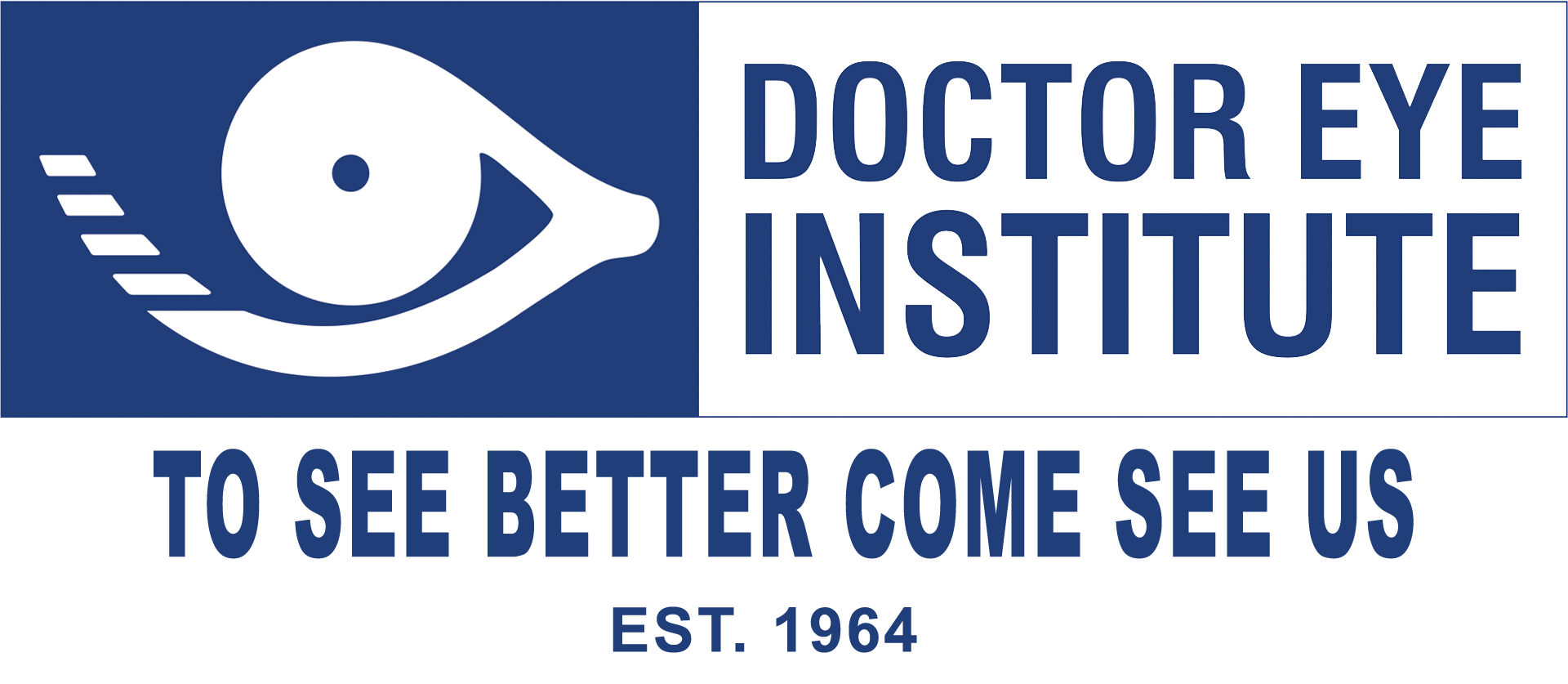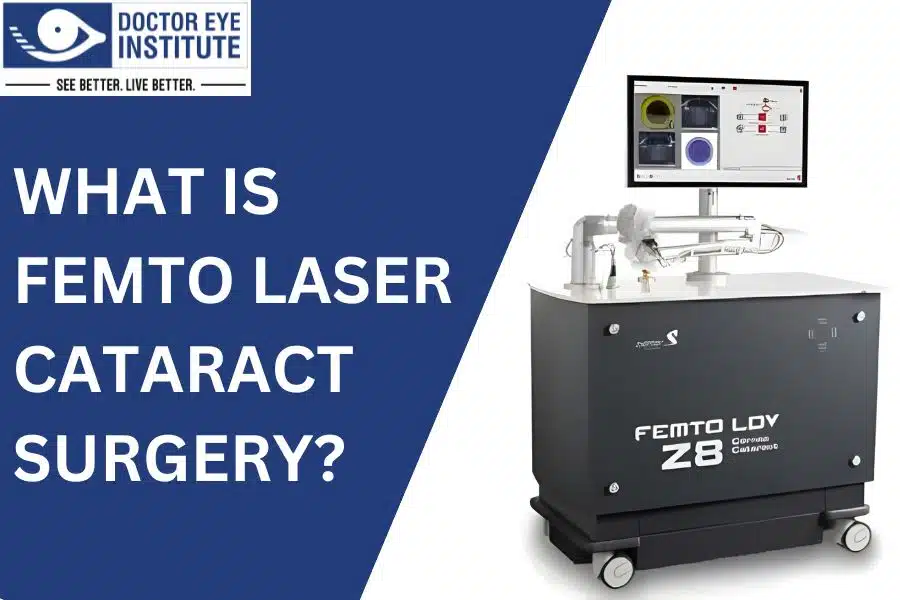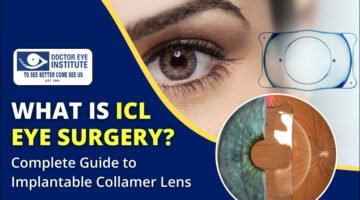Femto Laser Cataract Surgery: Revolutionizing Modern Cataract Treatment
Cataracts are a common eye problem where the lens in your eye gets cloudy, making your vision blurry and not as sharp as it should be. To fix this, doctors usually perform surgery where they remove the cloudy lens and put in a new, clear one. This surgery has been around for a while and works well, but it has some limitations. That’s why newer methods like femto laser cataract surgery have been developed to try to make the process even better.
What Is Femtosecond Laser Cataract Surgery?
Femtosecond laser cataract surgery is a modern way to remove cataracts, which are cloudy areas in the eye’s lens that can cause vision problems. This surgery uses a special laser, called a femtosecond laser, to make the procedure more accurate and efficient compared to traditional methods.
The femtosecond laser works by emitting extremely short pulses of light, each lasting just a tiny fraction of a second. These pulses can make clear cuts on the cornea without the need of any blade to do the same, open up the bag that contains the cataract and make customized pieces of the cataract out lens which can easily be removed with an ultrasound-guided phacoemulsification. These super-fast pulses allow surgeons to do very precise tasks with a high level of accuracy. This precision makes the surgery safer and gives better results for patients.
Here’s how femtosecond laser cataract surgery is different from traditional cataract surgery:
- Automated Steps: Instead of relying solely on manual techniques, the femtosecond laser automates several key parts of the surgery such as incision making, opening up of the bag – capsulorrhexis, fragmentation of nucleus. This reduces the chance of mistakes and makes the surgery more consistent.
- Precise Incisions: The laser can make very precise cuts in the cornea (the clear outer layer of the eye) with settings tailored to each patient. This leads to faster healing and less distortion of vision after the surgery.
- Capsulotomy: In cataract surgery, a small opening needs to be made in the lens capsule to remove the cloudy lens. The laser can do this with pinpoint accuracy, ensuring the opening is just the right size and in the right place every time.
- Lens Fragmentation: Instead of using ultrasound to break up the cataractous lens, the laser can do this more gently and precisely. This makes it easier to remove the cloudy lens.
- Better Lens Placement: The laser helps ensure that the new artificial lens, called an intraocular lens (IOL), is positioned perfectly for optimal vision after surgery.
Femto Laser Cataract Surgery Procedure
Femto laser cataract surgery marks a significant advancement in the field of ophthalmology, revolutionizing the traditional approach to cataract-removal surgery. This new method makes cataract removal surgery much better for patients.
A step-by-step breakdown of the surgical procedure:
- Pre-operative preparations: Before the surgery, the patient undergoes a comprehensive eye examination to assess the severity of the cataract and determine the appropriate course of action. This includes measuring the curvature of the cornea, determining the intraocular lens (IOL) power, and evaluating the overall health of the eye.
- Role of femtosecond laser in different stages: The femtosecond laser plays a crucial role in various stages of the cataract surgery procedure. Firstly, it assists in creating precise incisions in the cornea, allowing for a more predictable and controlled surgical outcome. Next, it helps in creating an opening in the lens capsule, enabling access to the cataract-affected lens. Additionally, the laser assists in fragmenting the cataract into smaller pieces, facilitating easier removal and reducing the need for manual manipulation within the eye.
- Femtosecond Z8: One of the latest advancements in femtosecond laser technology is the Femtosecond Z8 platform, which offers enhanced precision and efficiency in cataract surgery. This cutting-edge system delivers ultrafast laser pulses with unparalleled accuracy, allowing surgeons to perform delicate maneuvers with greater confidence and safety.
How long does laser cataract surgery take?
The time it takes for femto laser cataract surgery can vary depending on different factors. On average, though, it usually takes about 6 to 10 minutes for each eye.
Factors that affect how long it takes:
Severity of the cataract: If the cataract is more advanced, the surgery might take longer because the cloudy lens needs more time to break apart and remove.
Patient factors: Things like the thickness of the cornea and any existing eye conditions can also play a role. Plus, how well the patient can stay still during the procedure can impact the time it takes.
Recovery time after the surgery:
After femto laser cataract surgery, people tend to recover fairly quickly compared to traditional cataract surgery. Most People notice improved vision within a few days, and they usually fully recover within a few weeks. During this time, patients need to follow the instructions given by their surgeon. This might include using prescribed eye drops, avoiding heavy activities, and going to follow-up appointments to make sure everything’s going well.
Advantages of Femto Laser Cataract Surgery
- Enhanced Precision and Accuracy: With femto laser cataract surgery, surgeons use high-tech lasers to perform the procedure with incredible precision. This means they can make very precise incisions and deal with the cataract in a very accurate way. This accuracy leads to better results and lowers the chance of problems that can happen with older, manual methods.
- Reduced Risk of Complications: Compared to traditional surgery, using femto lasers lowers the risk of complications. The laser’s precise cuts mean less chance of accidentally damaging tissue during the surgery. Also, since much of the process is automated, it relies less on the surgeon’s manual skills, making it even safer.
- Faster Recovery and Better Vision: People who undergo femto laser cataract surgery tend to recover faster and have better vision afterward. The precise cuts made by the laser help wounds to heal quicker, so patients can get back to their normal activities sooner. Plus, because the surgery is so precise, it can be customized to each person’s eyes, resulting in clearer vision and less need for glasses after recovery.
Femto Laser Cataract Surgery in India
In India, more and more eye doctors are using a special kind of laser called femto laser to do cataract surgery. This technology is getting popular fast, especially in eye hospitals that want to give their patients the best care possible. With femto laser, cataract surgery has become much more advanced, raising the quality of eye treatment all over India.
We are among the few doctors in Mumbai who have offered Femto laser cataract surgery since a decade and now with our latest Swiss technology-powered Femto Z8 laser, cataract surgery has become so much easier. We are one of the first to get this specialized laser in Mumbai and are proud of the benefits it has for your eyes. This coupled with our latest acquisition of Veritas phaco machine for ultrasound phacoemulsification becomes the best option you can choose for your eyes or your
What our Patients Say: People who’ve had femto laser cataract surgery in India are really happy with the results. They’ve noticed big improvements in their vision and are overall satisfied with how things turned out. They talk about how precise the surgery was, how quickly they recovered, and how they don’t need glasses as much anymore. Knowing that this advanced technology is available makes patients feel confident about getting their cataracts fixed in India.
Closing Reflections
At Doctor Eye Institute in Mumbai, we’re excited about femto laser cataract surgery. It’s like going from using basic tools to having a super precise high-tech instrument! This amazing technology lets us do cataract surgeries with incredible precision. And the best part? It means patients recover faster, are happier, and have better vision afterward! It’s incredible to see how much we’ve progressed in eye care. We’re dedicated to staying up-to-date with these advancements to give our patients the best care possible. As femto laser cataract surgery becomes more common, it’s changing how cataracts are treated not only in India but worldwide. We’re proud to be part of this change, helping our patients see better and live better lives.
FAQs: Frequently Asked Questions
Q1. What is femto laser cataract surgery, and how does it differ from traditional cataract surgery?
A. Femto laser cataract surgery utilizes advanced femtosecond laser technology to perform key steps of the cataract removal procedure with exceptional precision. Unlike traditional surgery, where incisions are made manually with a blade and the cataract is fragmented using ultrasound energy, femto laser surgery involves the use of a laser to create precise incisions, capsulotomy, and cataract fragmentation, resulting in enhanced surgical outcomes.
Q2. Is femto laser cataract surgery safe?
A. Yes, femto laser cataract surgery is considered safe and effective for the treatment of cataracts. The use of femtosecond laser technology reduces the risk of complications associated with traditional surgery, such as corneal abrasions, capsular tears, and intraocular lens misalignment. However, as with any surgical procedure, there are potential risks and complications that patients should discuss with their surgeon before undergoing treatment.
Q3. How long does femto laser cataract surgery take?
A. On average, femto laser cataract surgery takes approximately 15 to 30 minutes per eye, though this can vary depending on the complexity of the case and any additional procedures that may be performed simultaneously. The actual laser portion of the surgery typically only takes a few minutes, with the remaining time devoted to lens removal, implantation, and post-operative care.
Q4. What are the advantages of femto laser cataract surgery over traditional surgery?
A. Femto laser cataract surgery offers several advantages over traditional cataract surgery, including enhanced precision and accuracy, reduced risk of complications, faster recovery, and improved visual outcomes. By utilizing femtosecond laser technology, surgeons can achieve unparalleled precision in creating incisions, capsulotomy, and cataract fragmentation, leading to better surgical outcomes and patient satisfaction.









